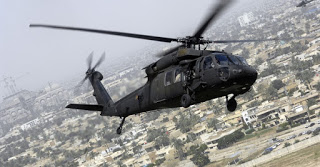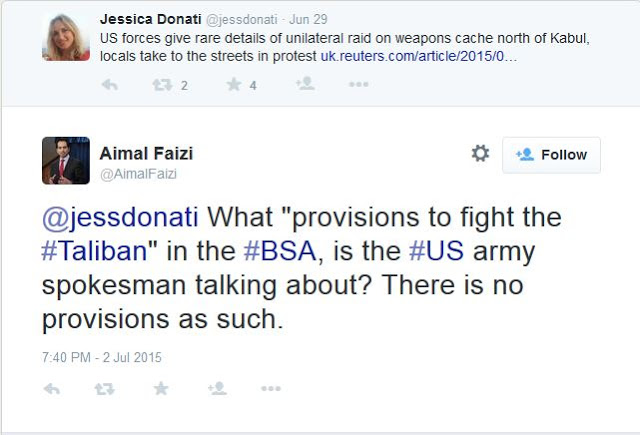| Online: | |
| Visits: | |
| Stories: |

| Story Views | |
| Now: | |
| Last Hour: | |
| Last 24 Hours: | |
| Total: | |
US Breaches International Law in Afghanistan Causing Massive Protests
A breach of international law is just one aspect of the questionable circumstances of a recent raid conducted by U.S. forces in Afghanistan. Text in the Bilateral Security Agreement (BSA) between the two countries appears to confirm as much. But that isn’t the only reason for revisiting this highly unusual raid.
Signed May 2, 2012, the BSA dictates rules and “laws” of conduct pertaining to U.S. assistance with the Afghan National Defense and Security Forces (ANDSF) after the NATO coalition concluded operations in 2014. The Agreement states:
The Parties agree to continue their close cooperation and coordination to those ends, with the intention of protecting U.S. and Afghan national interests without unilateral U.S. military counter-terrorism operations […] Cooperation and activities relating to implementation of this Agreement shall be consistent with the Parties’ respective commitments and obligations under international law […] United States forces shall not enter Afghan homes for the purpose of military operations and searches except under extraordinary circumstances involving the urgent risk to life and limb of U.S. nationals [emphasis added].
Despite the unmistakable, qualifying language of the text, the search and raid of the home of Jan Ahmad did not meet several parameters mentioned. Ahmad, who is not affiliated with al-Qaeda or the Taliban, did not pose an immediate threat. Pay attention to the language in the official statements about the raid, as well.
Around 4:30 a.m., the raid was conducted “to destroy a cache of munitions that could be used to conduct attacks against Afghan and coalition forces,” explained General John F. Campbell’s spokesperson, Colonel Brian Tribus. This involved “United States forces descending from helicopters,” according to an anonymous aide of Ahmad’s, as reported in the New York Times.
Reuters reported that Tribus “said the operation was conducted in keeping with bilateral military agreements” that “include provisions to fight the Taliban and other militants, and protect coalition forces.” After a thorough search of Ahmad’s home, U.S. soldiers blew up the entire weapons cache.
The circumstances surrounding this mission infuriated the local population to the extent that all area businesses were shuttered as massive protests ensued. Among the list of grievances was the U.S.’ failure to consult or coordinate with local authorities. Also noteworthy is the insistence by the same anonymous aide that Ahmad’s weapons dated back to the 1980s without any newer procurements. This would be in line with reports from as far back as 2007 that similar disarmament efforts found “mostly small arms” of which “at least 40 percent were not functional.”
 On close inspection, several blatant inconsistencies beg for answers.
On close inspection, several blatant inconsistencies beg for answers.
Why were U.S. forces conducting a unilateral mission in the first place? A pre-dawn raid searching for hidden weapons hardly constitutes an immediate threat of maiming or death. Even the official U.S. military spokesperson claimed the search was for weapons that could be used—how extraordinarily urgent could that be at 4:30 a.m.? And these weapons? Do troops need to be deployed from the sky when history bears little evidence that such a target would have newer or heavy weapons? Or that a sizable portion of them are even capable of functioning?
What about Tribus’ statements that the raid was permitted by stipulations in the BSA? Clearly, even the purpose of the raid doesn’t offer justification.
That discrepancy was picked up by Aimal Faizi, current liaison and former spokesperson for Hamid Karzai—president of Afghanistan through the end of September 2014. Faizi questioned the Reuters reporter on Twitter:
He has yet to receive a reply.
At the risk of posing the obvious question, what was the actual reason for this raid? What have we not been told? And why have we been given a story with the explanatory equivalence to wet tissue paper?
There is a final point—so conspicuous, it virtually screams for answers. Since NATO claims to have ended operations in Afghanistan in 2014, why is a colonel in the U.S. Army referring to “coalition forces” at all—more than halfway through 2015?
Claire Bernish writes for TheAntiMedia.org, where this article first appeared. Tune in! The Anti-Media radio show airs Monday through Friday @ 11pm Eastern/8pm Pacific.
Source: http://www.activistpost.com/2015/07/us-breaches-international-law-in.html





